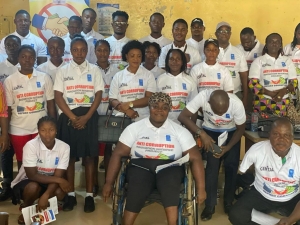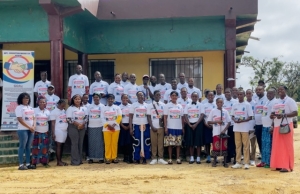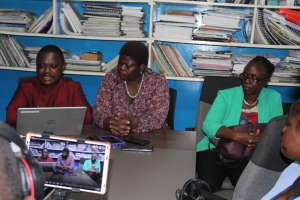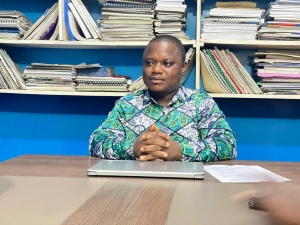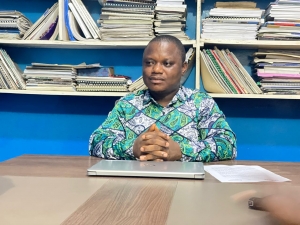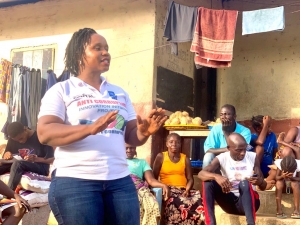LACC Joins CENTAL to Increase Knowledge Around Laws and Reporting Mechanisms in Nimba
LACC Joins CENTAL to Increase Knowledge Around Laws and Reporting Mechanisms in Nimba _By Edward Blamo
The Liberia Anti-Corruption Commission (LACC) and the Center for Transparency and Accountability in Liberia (CENTAL) have joined forces in engaging citizens around key components of the country’s anti-corruption framework. The effort proved helpful as citizens had the opportunity to directly engage with the LACC over concerns they have harbored. On October 6, 2023, a forum was held in Sanniquellie, Nimba County bringing together over 50 participants.
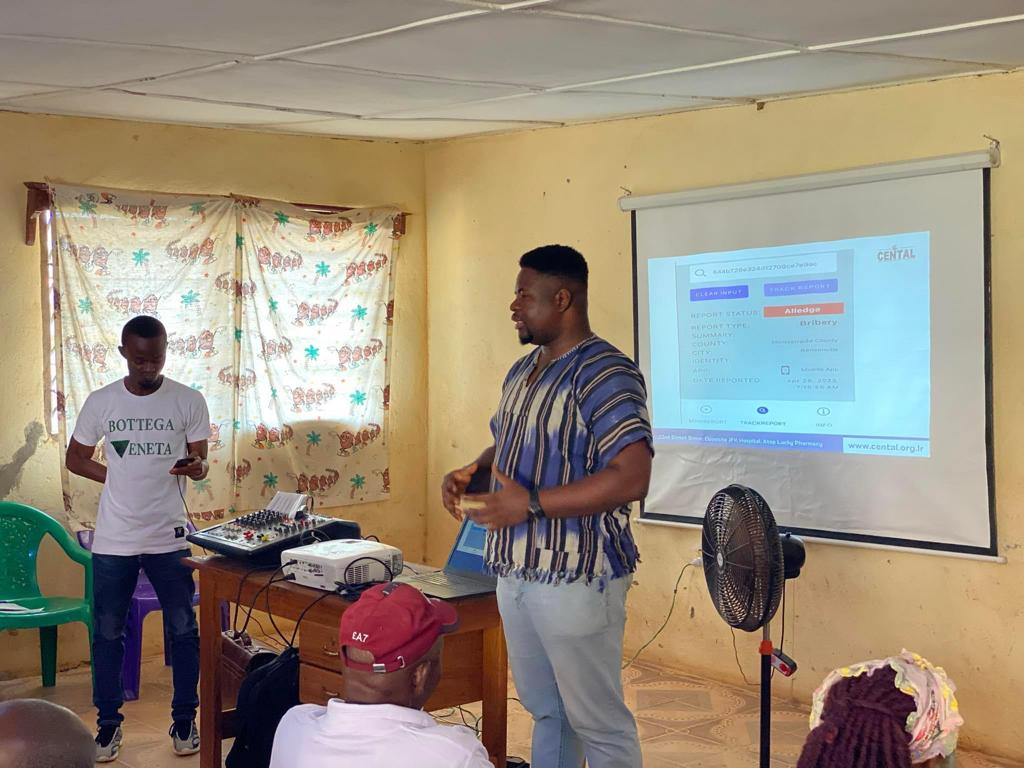
“We are here to talk about corruption. But most importantly, we are here to talk about the new ‘TALKAY’ platform and its effectiveness”, said Atty. Gerald D. Yeakula, Program Manager of CENTAL, gave an overview at the forum. The first two sessions of the day focused on the TALKAY platform for reporting corruption. Developed with support from the Swedish International Development Cooperation Agency (SIDA), the mobile application called ‘TALKAY’ provides the public the platform to report corruption allegations from anywhere without disclosing their identities. The strategy allows the use of the mobile app and website to file complaints of corruption by attaching multiple files (video, audio, document, with an option to remain anonymous or not.
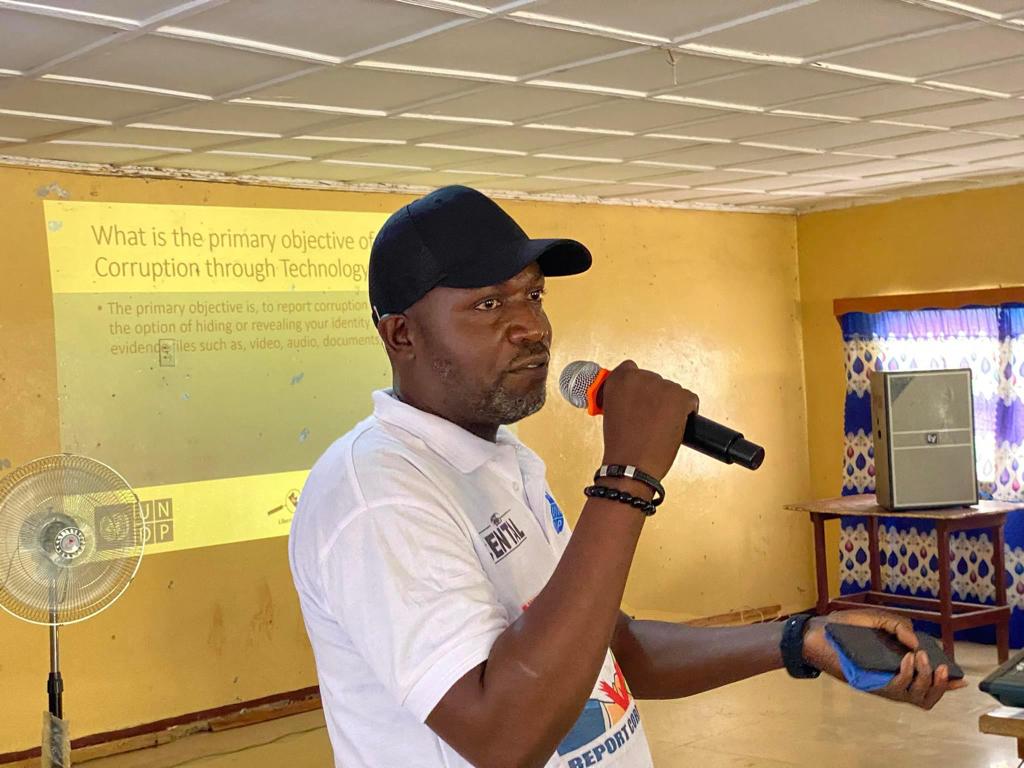
Lincoln J. Monbo of the Liberia Anti–Corruption Commission (LACC) informed participants that, so far, about 136 cases have been received through the TALKAY platform. Of these cases, he noted, bribery and molestation accounted for 49 and 30 respectively. He assured participants that the cases will be investigated. He encouraged the participants to report through the platform. All reports submitted using either the web app, mobile app, or SMS, he said will go to large-screen dashboards at the Liberia Anti-Corruption Commission (LACC) in real-time. The LACC then investigates the report and takes appropriate action. Once actions are taken, the system updates based on the action taken, and those filling reports can track the status of their report using their unique ID numbers issued when they submit their reports.
For his part, Cllr. Jerry D. K Garlawolo, LACC’s Chief Prosecutor, used the forum to give citizens insight into the new LACC law and how it will help the fight against corruption. “Now the investigators have police power. We can now go to court without the Ministry of Justice as was done in the past”, he stressed. Many believe that introducing this strategy is significant, especially when Liberia has reached its all-time low on the Corruption Perceptions Index of Transparency International, scoring 26 out of 100.
Sharing experiences with corruption, Jerry Myers, a member of the joint security explained a scenario where ‘arrest fees’ requested by a police officer at the station in Sanniquellie was refunded to the victim following his intervention. For her part, student Luise Tweh explained that a teacher in her school intentionally removed her name from those to sit the West Africa Senior Secondary School Certificate Examination (WASSCE) because he did not favor her. But when she engaged the school authority and the District Education Officer (DEO), the issue was resolved and her name was returned to the roster. “Corruption impedes development”, Rev. Joe G. Wallace, a prominent clergyman reckons. To back his assertion, he referenced a book in the bible specifically Exodus Chapter 20 verses 15 which he said spoke strongly against corruption.
Meanwhile, Nelson Yador, a prominent Civil Society (CSO) actor in Nimba was quick to commend CENTAL for its efforts in fighting corruption in the county over the years. “CENTAL is always here to teach us about ways to fight corruption. And we are extremely grateful to you”, he stated.
Like many other counties, Nimba, still reeling from a fourteen-year civil war that ended in 2003, still faces the challenge of social exclusion, poverty, and underdevelopment, all of which are byproducts of corruption and bad governance. About 90 percent of people surveyed in the 2022 State of Corruption Report released by CENTAL, think that the level of corruption in Liberia is high. But despite these, a new strategy to utilize the use of technology to nip the scourge of corruption in the bud is gaining steam in Nimba County.
In Bomi County, Citizens Encouraged To Utilize New Mobile App To Report Corruption
In Bomi County, Citizens Encouraged To Utilize New Mobile App To Report Corruption
By: Mark W. Boahndao
In the ongoing battle against corruption, a significant roadblock that often hinders progress is the pervasive fear of retaliation. In some instances, whistleblowers, some of whom are public servants, who dare to expose corrupt practices often find themselves in precarious situations threatening their livelihood and safety. This culture of fear undermines the effectiveness of anti-corruption efforts in multiple ways—silencing the whistleblower, impeding transparency, et cetera.
To reduce the risk of exposure for whistleblowers and improve citizens' confidence to report corruption without revealing their identities, the Anti-Corruption Innovation Initiative project is encouraging citizens to make use of a mobile application ‘TALKAY’ developed to report corruption. To implement the project, the Center for Transparency and Accountability in Liberia (CENTAL) is working in partnership with the Liberia Anti-Corruption Commission (LACC), Integrity Watch Liberia, and Accountability Lab Liberia with support from the Swedish International Development Cooperation Agency (SIDA) through the United Nations Development Program (UNDP).
On the 29th of September 2023, the one-day dialogue held at the multipurpose building in Tubmanburg, Bomi County, citizens were not only introduced to the app, including issues arising therefrom but were provided insights into the anti-corruption laws as well as an election reference guide developed by CENTAL.
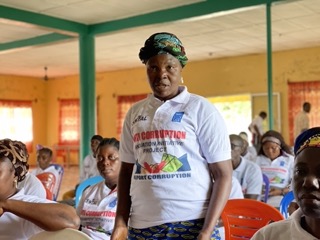 “Corruption is difficult to report. When we report happenings of corruption, limited action is taken. In the end, we will remain the victim of it. How can we report?” – Miatta A. Kanneh, a marketer pointed out stoutly. Thankfully, the LACC graced the occasion and afforded citizens the express burning concerns. Making a presentation, Cllr. Jerry D.K. Garlawolu, Chief Prosecutor of the Liberia Anti-Corruption Commission (LACC) succinctly explained the mandate and functions of the LACC as a lead anti-graft institution in Liberia. He further emphasized the relevance and advantages of the Whistleblower and Witness Protection Acts. His presentation opened the minds of the participants to the workings of LACC and the different laws that exist to discourage them from hiding acts of corruption when it is visible.
“Corruption is difficult to report. When we report happenings of corruption, limited action is taken. In the end, we will remain the victim of it. How can we report?” – Miatta A. Kanneh, a marketer pointed out stoutly. Thankfully, the LACC graced the occasion and afforded citizens the express burning concerns. Making a presentation, Cllr. Jerry D.K. Garlawolu, Chief Prosecutor of the Liberia Anti-Corruption Commission (LACC) succinctly explained the mandate and functions of the LACC as a lead anti-graft institution in Liberia. He further emphasized the relevance and advantages of the Whistleblower and Witness Protection Acts. His presentation opened the minds of the participants to the workings of LACC and the different laws that exist to discourage them from hiding acts of corruption when it is visible.
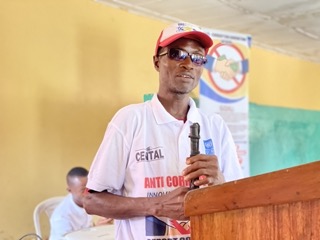 “We will try to report, but actions must be taken to serve as a deterrent for people who want to get involved with corruption” – Saamo Peters, a member of the disabled community. Continuous reporting of corruption is a crucial tool in the fight against this pervasive issue. When citizens witness corruption daily but are afraid to report it due to potential negative outcomes, it perpetuates a culture of impunity and allows corruption to thrive. However, optimism is high that making maximum use of technology will thrive in the war against corruption.
“We will try to report, but actions must be taken to serve as a deterrent for people who want to get involved with corruption” – Saamo Peters, a member of the disabled community. Continuous reporting of corruption is a crucial tool in the fight against this pervasive issue. When citizens witness corruption daily but are afraid to report it due to potential negative outcomes, it perpetuates a culture of impunity and allows corruption to thrive. However, optimism is high that making maximum use of technology will thrive in the war against corruption.
The one-day dialogue which brought over forty (40) citizens including heads of women's groups, religious heads, county officials, youth, and persons with disabilities representatives stimulated provocative talks and reemphasized the usage of the Talkay mobile app and other mediums of reporting. This gathering espoused the need for more citizen engagement around the country. Additionally, with the elections at the heart-point of the discussions, citizens were encouraged to make use of a Decision-Making Reference Guide that was developed to guide citizens about ways to go about in the upcoming general and presidential elections. The guide among other things highlighted issue-based decisions citizens are to make and take into consideration when voting before and after elections.
Maintain the Integrity of the Elections and Preserve the Peace: CSOs Call on NEC and Political Parties and Candidates
JOINT PRESS STATEMENT
By Civil Society Organizations on the October 10, 2023 Elections
Maintain the Integrity of the Elections and Preserve the Peace: CSOs Call on NEC and Political Parties and Candidates
(October 17, 2023) Distinguished ladies and gentlemen of the Press, fellow Liberians and development partners. A very warm welcome to this press conference, convened by several renowned civil society organizations. They include the Center for Transparency and Accountability in Liberia (CENTAL), Integrity Watch Liberia (IWL), Organization for Women and Children (ORWOCH), Women NGO Secretariat (WONGOSOL), Public Health Initiative of Liberia (PHIL), and Accountability Lab Liberia (Alab). Others are Institute for Research and Democratic Development (IREDD), Paramount Young Women Initiative (PAYOWI), Community Healthcare Initiative (CHI), Sister AID Liberia Incorporated (SALI), Civil Society Human Rights Advocacy Platform, and Kids Educational Engagement Program (KEEP Liberia). These and other CSOs have been very active during these elections, in part through conducting civic and voters’ education; monitoring/observing campaign promises and finance, electoral violence, including those targeting women and disadvantaged groups, voting, etc. We recognize cordial working relationships mutually-benefiting partnerships with the National Elections Commission, media, and other stakeholders that made these contributions possible.
Exactly one week ago, Liberians turned out in mass to elect leaders of their choice, including a president, vice president, 15 senators, and 73 representatives. We applaud the courage and commitment of Liberians to vote and shape the country’s future, despite some of their past and current leaders not doing enough to tangibly transform their lives.
As observed by both local and international observers, overall, the voting process was conducted in a peaceful and free manner. Access to the voting centers and ballot-counting process allowed civil society, the media, representatives of political parties and independent candidates, and international partners to closely observe the process, thus increasing its inclusiveness, transparency, and credibility. The National Elections Commission has been tallying and announcing provisional results from the elections, in largely transparent and open manner. These are notable positive developments and signs of the growth of Liberia’s democracy.
Despite the success of the voting and ongoing announcement of preliminary results, we are concerned about multiple issues associated with the elections.
Firstly, the pace of the counting and announcement processes is very slow, especially for highly accessible areas. With increased anxiety and brewing tension among citizens, political parties, and candidates, NEC needs to be more efficient in tallying and announcing final results to calm down nerves. After nearly one week, the tallied votes and results from some counties and districts are still below 60%. This is concerning. Additionally, it is concerning to observe the confrontational approach taken by NEC Commissioners when interacting with journalists. This adds to the very late start of daily press conference, 5pm instead of the 4:30 pm schedule publicized. Unexplained delays in announcing final results from electoral district 8 in Montserrado County, District 2 in Mary Land County, and District 4 in Grand Bassa County raises concerns.
We acknowledge the 15-day window stipulated in Article 83(c) of the Liberian Constitution; however, we also observe the slow pace with which results are announced, as well as the delay in releasing results from places that are obviously accessible in favor of more remote areas without any reason given by the Commission. The more the results are delayed, with no clear information and explanations, the more people will speculate about alleged wrongdoings or foul play. It is in NEC’s best interest, as well as the integrity of the elections and peace of country, to timely process and announce all results from the elections.
Finally, we have received distressing reports of violence and storming of the tallying centers in Montserrado and Nimba Counties by supporters of some political parties and candidates, especially the Coalition for Democratic Change (CDC). This is extremely troubling, as it could be interpreted as attempts to manipulate/undermine the integrity, transparency, and independence of the votes counting process. Furthermore, we are deeply concerned about some candidates and political parties declaring themselves as winners, when NEC is the only institution mandated by law to do so. This is a recipe for violence, as it may incite overzealous partisans and supporters to act in ways that jeopardize the peace of the country. Calm and maturity are needed, as we await the final results from the National Elections Commission.
Recommendations:
In view of the above, we like to make the following broad and specific recommendations:
1. NEC
- Enhance efficiency and expediency in counting and reporting/announcing the election results as well as respect time announced for commencement of the daily press conference
- Show understanding and empathy when addressing concerns from journalists
- Fully implement guidelines and regulations governing the elections, including but not limited to sanctioning candidates and political parties that will contravene established laws.
- Clearly inform the public about reasons why some districts are yet to be completed, especially in accessible locations.
2. Political Parties and Independent Candidates
Respect the electoral rules and guidelines and refrain from individual and collective actions that could undermine the credibility of the elections as well as incite violence and jeopardize the peace of the country.
3. Stakeholders and other Civil Society
Continue the engagements with the electoral process, working collaboratively with NEC to ensure a free, transparent and credible process.
Conclusion
As the electoral process is still ongoing, we would like to call on all candidates and political parties as well as the general public to remain calm, peaceful, tolerant, and closely observe the process. We urge individuals and groups with grievances to address them through established mechanisms. The rule of law must prevail at all times in Liberia, especially during these elections. Let’s work to preserve the peace and show to the world that we are capable of managing our electoral and other key processes, with the required levels of inclusiveness, transparency, fairness, and integrity.
Thank you.
Signed:
______________________________________________________________
Anderson D. Miamen, (Center for Transparency and Accountability in Liberia)
______________________________________________
Naomi Tulay-Solanke, (Community Healthcare Initiative)
____________________________________________________________
Adama Dempster, (Civil Society Human Rights Advocacy Platform of Liberia)
__________________________________________________
Atty. Mmonbeydo Joah, (Organization for Women and Children)
____________________________________
Harold Marvin Aidoo, (Integrity Watch Liberia)
_____________________________________
Lawrence Yealue, (Accountability Lab Liberia)
________________________________________________________
Matthias Yeanay, (Institute for Research and Democratic Development)
_______________________________________
Joyce Kilikpo, (Public Health Initiative of Liberia)
_______________________________________
Miatta Darwolor, (Sisters AID Liberia Inc.)
______________________________________________
Esther Davies-Yango, (Women NGO Secretariat of Liberia)
____________________________________________
Atty. Facia Harris, (Paramount Young Women Initiative)
_______________________________________________-
Brenda Moore, (Kids Educational Empowerment Program)
Press Statement for Immediate Release
CENTAL Encourages New LACC Commissioners to Lead by Example and Be Robust
Monrovia, Tuesday, September 12, 2023
Distinguished members of the press, fellow Liberians, and partners. We would like to appreciate Liberians for their largely peaceful participation in the ongoing campaign activities, which are key components of the ensuing Presidential and Legislative Elections. As the election date gets nearer, we would again like to remind the various political parties and candidates about their responsibility to uphold the Farmington Declaration, which was signed on April 4, 2023, demanding peaceful, free, fair, and credible elections. Also, CENTAL would like to remind Liberians about the need to properly examine the various Candidates vying for public offices. Voting for corrupt and bad leaders will mean stalling the development and progress of the country. So, be careful whom you vote for, as you will have to live with the consequences of your October 10, 2023 decisions/choices for the next six to nine years.
Ladies and Gentlemen of the Press, on September 6, 2023, the Liberian Senate confirmed the seven (7) Liberia Anti-Corruption Commission’s Commissioners who were nominated by President Weah on June 8, 2023. Those confirmed by the Liberian Senate included Cllr. Alexandra Kormah Zoe, Chairperson, Mr. Ernest R. Hughes, Vice Chairperson, and Mr. Randolph E. Tebbs, Commissioner for Monitoring and Investigation. Dr. Miatta Jeh and Atty. Samuel F. Dakana were confirmed as Commissioners for Monitoring and Investigation, while Cllr. Oretha Snyder Davis and Cllr. David Wilson were confirmed as Commissioners for Prosecution respectively.
CENTAL commends the government of Liberia, its partners, and Civil Society Organizations for their roles played throughout the process, which led to the vetting of these Liberians, their nomination by the President, and subsequent confirmation by the Liberian Senate. Essentially, also, we like to commend the outgoing leadership of LACC, especially Cllr. Edward Kla Martin and his team for bringing relative stability and sanctity to the Commission, after a turbulent past, as the Commission was largely in the media for the wrong reasons. The new batch of officials have an appreciable foundation upon which they can build.
Fellow Liberians, Liberia needs a robust, independent, well-resourced, and public-interest driven LACC more than ever before. This is particularly important as Corruption is becoming pervasive in Liberia, especially in the public sector. Government’s 26 score out of a possible 100 on the 2022 Corruption Perception Index (CPI) of Transparency International shows the scale of the problem at hand. The lack of actions against public officials sanctioned by the United States Government for alleged significant corruption shows lack of will and major gaps in the Liberian government’s anti-corruption efforts. Thankfully, on the other hand, citizens are becoming more concerned and demanding accountability and transparency from their government.
Considering the criticality of the Liberia Anti-Corruption Commission (LACC) in the fight against corruption in Liberia, we encourage the new corps of officers to tread cautiously and lead by example during the discharge of their duties. With the confirmation of these officials, the public expects to see a new, energized, and robust LACC, especially now that it has Direct Prosecutorial Power, which has since been lacking. The Country cannot afford to waste any more time in decisively dealing with her worst enemy: Corruption. While we acknowledge past efforts, they have not been enough to give Liberians the positive results anticipated, as public officials abuse public resources with so much Impunity.
The burden is on the new batch of Commissioners to change these negative narratives and give hope to Liberians by making impunity for corruption an issue of the past. CENTAL, the public, development partners, and other stakeholders will be keenly watching to see if this new LACC will live up to expectations by serving the Liberian people, instead of appointing authority or so-called big hands in government and other places in society. We urge the new leadership to endear itself to the public by robustly, timely, and impartially investigating and prosecuting alleged incidences of corruption, including those involving “big hands” in the government.
In conclusion, we call on the national government to provide adequate financial and logistical support to the Commission to operate robustly and independently. Meanwhile, we call on the Commission to forge meaningful partnerships with stakeholders, including civil society and citizens, if it must succeed in its work. Additionally, we call on development partners to provide financial and logistical support to the Commission to be fully operational. We firmly believe that the success of Liberia’s anti-corruption endeavors hinges on collective vigilance and collaborative efforts. CENTAL recommits to being a key partner in this regard.
Thank you.
Signed:
Management
0886818855/0776391481
Request for External Auditor
August 1, 2023
REQUEST FOR PROPOSAL
TERMS OF REFERENCE FOR AUDIT OF CENTAL
1. Introduction
CENTAL, hereafter referred to as the “Cooperation Partner” wishes to engage the services of an audit firm for the purpose of auditing the National Integrity Building and Anti-Corruption (NIBA) or "Liberia Anti-Corruption Integrity Programme’, as stipulated in the agreement between the Cooperation partner and Sida. The audit shall be carried out in accordance with international audit standards (ISA) issued by IAASB[1]. In addition, an assignment according to International Standards on Related Services (ISRS) 4400 shall be carried out. The audit and the additional assignment shall be carried out by an external, independent, and qualified auditor.
- Qualification of the Firm/Auditor and Key Requirements
The audit shall be performed by a certified audit firm in good standing with the Liberia Institute of Certified Public Accounts (LICPA). Other qualifications of the auditor/firm are:
- Must have at least two years of experience performing independent and professional audit (s) of key institutions, especially non-governmental organizations, in accordance with the International Standards on Auditing (ISAs).
- Must be completely impartial and independent from all aspects of management or financial interests in the entity being audited.
- Must not be employed by, serve as director for, or have any financial or close business relationships with any senior participant in the management of the entity, especially during the period covered by the audit nor while undertaking the audit. It is required that the auditor discloses any relationship (s) that might possibly compromise his/her independence.
- Must be experienced in applying either ISA or INTOSAI audit standards, whichever is applicable for the audit.
- And must assign adequate staff with appropriate professional qualifications and suitable experiences with ISA or INTOSAI standards, including experiences in auditing the accounts of entities comparable in size and complexity to the entity being audited.
3. Objectives and Scope of the Audit
The objective is to audit the financial report for the period 1st August 2022 to 31st July 2023, as submitted to Sida, and to express an audit opinion according to ISA, applying ISA 800/ISA 805, on whether the financial report of the National Integrity Building and Anti-Corruption Program or ‘Liberia Anti-Corruption Integrity Programme’ is in accordance with the Cooperation partner´s accounting records and Sida’s requirements for financial reporting, as stipulated in the agreement including appendices between Sida and Cooperation partner (Agreement).
4. Additional assignment; according to agreed-upon procedures ISRS 4400, review the following areas in accordance with the Terms of Reference below
Mandatory procedures that must be included:
- Observe whether the financial report is structured in a way that allows for direct comparison with the latest approved budget[2].
- Observe and inspect whether the financial report provides information regarding:
- Financial outcome per budget line (both incomes and costs) for the reporting period and columns for cumulative information regarding earlier periods under the current agreement.
- When applicable, compare if the opening fund balance[3] for the reporting period matches with what was stated as the closing fund balance in the previous reporting period.
- A disclosure of exchange gains/losses. Inquire and confirm whether the disclosure includes the entire chain of currency exchange from Sida’s disbursement to the handling of the project/program within the organization in local currency/ies, if applicable.
- Explanatory notes (such as for instance, accounting principles applied for the financial report).
- Amount of funds that has been forwarded to implementing partners, when applicable.
- a) Inquire and inspect with what frequency salary costs during the reporting period are debited to the project/program.
Choose a sample of three individuals for three different months and:
- Inquire and inspect whether there is supporting documentation[4] for debited salary costs.
- Inquire and inspect whether actual time worked is documented and verified by a manager. Inquire and inspect within which frequency reconciliations between debited time and actual worked time is performed.
- Inspect whether the Cooperation partner complies with applicable tax legislation with regard to personal income taxes (PAYE)[5] and social security fees.
4. a) Inspect and confirm that the unspent fund balance (according to the financial report) at the end of the financial year is in line with the information provided in the accounting system and/or bank account.
5. Procurements:
a) Inquire and inspect whether the Cooperation partner has purchased services or goods above the thresholds in the procurement guidelines annexed or referred to in the agreement. Obtain a list of all purchased services and goods during the reporting period and identify all transactions above the agreed threshold.
b) Select two of the identified transactions above the threshold and determine whether they were subject to bidding procedures and in compliance with procurement requirements, if applicable.
5. The Reporting
The report shall be signed by the responsible auditor (not just the audit firm[6]) and shall include the title of the responsible auditor.
Reporting from the ISA assignment
The report from the auditor shall include an independent auditor’s report in accordance with the format in standard ISA 800/805 and the auditor’s opinion shall be clearly stated. The financial report that has been the subject of the audit shall be attached to the audit report.
The report shall also include a Management letter that discloses all audit findings, as well as weaknesses identified during the audit process. The auditor shall make recommendations to address the identified findings and weaknesses. The recommendations shall be presented in priority order and with a risk classification.
Measures taken by the Cooperation partner to address weaknesses identified in previous audits shall also be presented in the Management Letter. If the previous audit did not have any findings or weaknesses to be followed-up on, a clarification of this must be disclosed in the audit reporting.
If the auditor assesses that no findings or weaknesses have been identified during the audit that would result in a Management Letter, an explanation of this assessment must be disclosed in the audit reporting.
Reporting from the ISRS 4400 assignment
6. Submission of Audit Report
A minimum of six (6) copies of the signed report will be submitted to CENTAL for further use or publication.
7. Cost of Audit
The audit will be performed for a reasonable amount that will represent/cover all costs associated with the work to be performed. The payment term shall be agreed between the Cooperation Partner (CENTAL) and the audit firm. However, it will be in not less than two installments, with the final payment made following the successful completion of the task and submission of the final report, in line with the TOR.
8. Application Procedure and Package:
All interested qualified applicants are encouraged to email their complete applications/proposals to This email address is being protected from spambots. You need JavaScript enabled to view it. with a certified copy to This email address is being protected from spambots. You need JavaScript enabled to view it. and This email address is being protected from spambots. You need JavaScript enabled to view it. on or before August 17, 2023, at 11:59 PM local time. In addition to other documents and requirements, the application package should include the Curriculum vitae (CVs) of the principal of the firm of auditors who would be responsible for signing the opinion, together with the CVs of managers, supervisors, and key personnel proposed as part of the audit team. CVs submitted should include details of audits carried out by the applicable staff, including any ongoing assignment (s) indicating capability and capacity to satisfactorily undertake the task in question.
[1] The International Auditing and Assurance Standards Board (IAASB)
Template decision no:2021-002235 Department: VERKSTOD/JUR Other:
Version no: 1.2 Date: 20211110 Other:
[2] The budget is attached to the agreement with Sida as an annex and any updates should be supported by written approval by Sida.
[3] I.e. funds remaining from disbursements made during the previous reporting period/s
[4] Debited salary costs should be verified by supporting documentation such as employment contracts.
[5] Pay As You Earn
Liberia: Inadequate Support to the Disabled Hampered Livelihood
Liberia: Inadequate Support to the Disabled Hampered Livelihood
Written by: Akiah P. Glay. Dormoh
August 7, 2023, 2023
_________________
Introduction:
For ages, the quality of life for people living with disabilities has been negatively impacted by a combination of societal attitudes, limited accessibility, inadequate educational structures, and system. poverty. And living in Liberia, whose economy is still struggling to recover from the effects of the Ebola and COVID-19 pandemic, access to basic life necessities like education, healthcare, and economic empowerment for persons living with disabilities has become even more cumbersome.
Globally, an estimated 1.3 billion people, or 16% according to the World Health Organization (WHO) experience a significant disability. The WHO Global Report[1] on health equity for persons with disabilities demonstrates that while some progress has been made in recent years, the world is still far from realizing this right for many persons with disabilities who continue to die earlier, have poorer health, and experience more limitations in everyday functioning than others. And in Africa, according to World Bank data, approximately 80 million[2] people are living with a disability.
Sadly, in Liberia, current and accurate data on disability is unknown. Nevertheless, Population Services International believes that the war may have contributed to the increase of disability in Liberia from an initially reported 16% in 1997[3] to nearly 20%, which is significantly higher than the world’s average of 10%[4]. According to HOPE, a group whose mandate is to provide vital support for children who have lost their limbs through war, accidents, and lack of access to medical care, about 99%[5] of people with disabilities live in extreme poverty compared to 48% of the population, and only one-third 1/3 of school-age disability children are enrolled in school. This means people living with disabilities in Liberia are at a heightened vulnerability of legal and economic inequalities, abuse, and human rights violations which increases their risk of living in extreme poverty. The article calls for the promotion, accessibility, and inclusion of persons with disability in all areas of society in Liberia including education, employment, public spaces, and healthcare. It highlights the importance of removing physical and attitudinal barriers that hinders the full participation of individuals with a disability. This includes providing reasonable accommodations, ensuring equal access to information, and services, and fostering an inclusive environment that values diversity.
Disability in Context:
Disability is a complex concept that can be defined and understood in various ways depending on the context and perspective. While the definition may seem similar, the Medical Model of Disability defines it as an impairment or conduction that limits an individual’s physical, sensory, cognitive, or mental abilities. According to the model, disability is seen as a personal problem that needs to be diagnosed, treated, or cured discretely. There are various types of disability in Liberia ranging from speech impairment to mental inability. Due to a lack of data on disabilities, it is difficult to mention accurately all forms of disabilities. The 2008 National census indicated the different kinds of disabilities in Liberia, including persons with limited use of legs and arms or amputees, hearing, sight, and speech difficulty, persons with mental retardation, and persons with multiple disabilities[6]. In the years since the end of the war in 2003, Liberia has taken steps towards ensuring disabilities population is recognized, but numerous challenges still remain. In 2005, the National Commission on Disabilities was established and the 2018[7] National Action Plan for Inclusion of Persons with Disabilities was also adopted for the inclusion of persons with disabilities. The goal of the plan is to promote the welfare and rights of the disabled in Liberia, while also aiming to include them in the governance process and provide financial assistance through social security. These fine-drafted policies and institutions will continue to encounter challenges if deliberate efforts are not made to promote education and eliminate poor standards of living among disabled people in Liberia.
Though persons living with disabilities could be classified as male or female, in many cases, it is appropriate to disaggregate women, men, and persons living with disabilities data in order to understand and address their specific needs. For instance, women may experience gender-based discrimination and inequality, as such unequal pay, limited access to education, and gender-based violence. On the other hand, persons living with disabilities may face barriers related to accessibility, discrimination in employment, or limited access to healthcare. Therefore, it is important to strike a balance between recognizing the specific needs and experiences of different groups while also acknowledging the potential intersections of identities and the challenges faced by individuals who belong to multiple marginalized groups. It helps to ensure a comprehensive and inclusive approach to addressing inequalities and promoting social justice.
Challenges
First and foremost, the lack of accurate and up-to-date data on disability could affect capacity building, policy development and implementation, awareness and advocacy, and a lot more. Without accurate data, it becomes difficult for governments and organizations to allocate resources effectively. Funding and support may not be allocated in proportion to the actual number and specific needs of individuals with disability resulting in limited access to essential services, such as healthcare, employment, and social support[8]. Funding allotted to disability does not seem to produce a better outcome as persons with a disability still find it difficult to integrate into society[9].
|
Support to persons living with disability in two years 2022-2023 |
|||||
|
Year |
support to NCD |
Support under the office of the Vice President (Group of 77 |
Education Sector (Liberia School of the Blind) |
Youth and Sport (Deaf & Dumb Alethic Association |
Total |
|
2022 |
$629 098 |
$423 727 |
$50 000 |
$2 000 |
$1 104 825 |
|
2023 |
$555 897 |
$413 727 |
$50 000 |
$2 000 |
$1 021 624 |
Support from the national government to education for persons living with disability is limited as seen in the table above. The evaluation of the Liberia National Action Plan 2018-2022, undertaken in tandem with the development of the next disability inclusion plan NAP 2023 – 2027, with support from UNDP, found that disabilities livelihood has seen very little improvement; and it can be contributed lack of political will, a systemic belief that disability is a low priority issue, and lack of accountability is grossly undermining the rights, wellbeing, and inclusion of people with disabilities[10] financial allotment from the government to disabilities organizations clearly show the lack of interest exerted.
The 2022 and 2023 fiscal year budget shows US$ 50.000 to support education for the blind. That amount divided by fifteen counties will mean, each county will receive US% 3,333 annually for education, which is relatively nothing. Not to mention the US$ 2,000 that is allotted for sports. There are numerous constraints amongst persons living with disability in Liberia that need to be addressed. In employment, persons with disability are barely spotted, and income-generating opportunities are limited. Most of them have limited vocational training skills because of the lack of educational opportunities. Also, many public infrastructures and facilities in Liberia, such as transportation, buildings, and public spaces, lack adequate accommodation for disabled people. A Report of Community-Based Emancipatory Disability Research (CB-EDR) 2018- done by AIFO expresses the many challenges encountered by persons with disabilities. The report acknowledges that there exist barriers to educational opportunities for persons with disability. According to the report, in Grand Gedeh County, out of 600 disabled children, only 10 were in school, and in Nimba, out of 22 visual impair persons, only 2 had had higher education while the remaining 20 had no education. Aside from educational opportunity, Issues related to lack of livelihood opportunities and widespread poverty was key component found in the report[11]. With the adoption of the Sustainable Development Goals, and Pro-Poor Government Agenda pillar 5 that promotes inclusion and the NCD Act of Liberia, there should be a national momentum to ensure that marginalized groups, not least people with disabilities, are included, and accounted for in the mainstream development efforts in Liberia. Policies are not enough, enforcement and implementation of the policies and the government’s willingness to vigorously engaged and address issues relating to disabilities will to some extent elevate disabled people from poverty. This will require robust evidence on both the current situation of people with disabilities and the effectiveness of various approaches to support inclusion. It is visible that other countries including South Africa are initiating policies to promote employment opportunities for the disabled such as its 1998 Employment Equity Act and its Skill Development Act that recognizes
people with disabilities as one of the target groups for the purposes of skills development and advancement in the workplace. Also, the implementation of the 2011 Sierra Leone Disability Act led to the recruitment of four (4) police officers to work in the communication center. This is a great lesson and Liberia must learn and enhance the livelihood of persons with disability.
Conclusion and Recommendation
The government needs to conduct regular surveys, studies, or data to ensure the information on persons with disabilities remains up to date in order to be informed on how to tailor programs and services for persons with disability. Also, the governments shall create policies and initiatives that promote the employment of persons with disabilities. This may include setting quotas for disability representation in the workforce and providing incentives to employers who hire persons with disabilities. Finally, the government needs to allocate adequate financial resources to support programs and services to meet the needs of persons with disabilities. This includes funding for inclusive education, vocational training, assistive technologies, and other support services. In conclusion, promoting equality for disabled individuals is a fundamental aspect of a just and inclusive society. identifying and treating disability issues discreetly is a way to challenge societal biases and stereotypes associated with disabilities. It encourages a shift in focus from the disability itself to the abilities and potential of each person. By emphasizing equality, we can create an environment that embraces diversity and provides equal opportunities for all individuals, regardless of their abilities.
[1] Kamenov. D; Barrett, D; Pearce, E; et al (2022); Global Report on Health Equity for Persons with Disability (World Health Organization; (P; 16) retrieved July 17, 2023
[2] The World Bank: “ Challenges Facing Persons with Disabilities in Sub-Saharan Africa-in 5 Charts (Retrieved 17/07/23): https://www.worldbank.org/en/topic/poverty/brief/challenges-facing-people-with-disabilities-in-sub-saharan-africa-in-5-charts
[3] Azubike C Onuora-Oguno: “African Disability Right Year Book: (retrieved July 18, 2023)
https://www.adry.up.ac.za/country-reports-2020/liberia
[4] Building Market “Changing Liberian Attitude Towards the Disabled (2013) Retrieved (July 18, 2023): https://buildingmarkets.org/changing-liberian-attitudes-toward-the-disabled/
[5] Elizabeth’s Legacy of HOPE: Some Facts about Liberia (Retrieved July 18, 2023) https://elizabethslegacyofhope.org/amputees/country-profiles/country-profile-liberia/
[6] Deepak, Sunil (2021) “Barriers Faced by Persons Living with Disabilities in Liberia Report of a Community-Based Emancipatory Disabilities Research (CB-EDR 2018-2019): Retrieved july, 2023: https://www.researchgate.net/publication/356357123_Barriers_Faced_by_Persons_with_Disabilities_in_Liberia_Report_of_a_Community-Based_Emancipatory_Disability_Research_CB-ED
[7] The United Nations Development Program (UNDP) 2018-2022 National Action Plan for Inclusion of Persons with Disabilities in Liberia https://changemakersforchildren.community/system/files/2021-05/National%20Action%20Plan%20on%20the%20Inclusion%20of%20Persons%20with%20Disabilities.pdf
[8] Liberia National Budget Fiscal Year 2022 (P: 321; 103; 314; 301) file:///C:/Users/Admin/Downloads/BudgetBook2022%20_V2%20(4).pdf
[9] Disability and Poverty in Liberia (October 2021) Retrieved, July 18, 2023: https://borgenproject.org/disability-and-poverty-in-liberia/
[11] AIFO Report of a Community-Based Emancipatory Disability Research (CB-EDR) “Barrier Faced by Persons Living with Disabilities in Liberia-2018-2021: https://aifoliberia.org/wp-content/uploads/2022/07/Liberia_EDR_Full-Report.pdf
Press Statement for Immediate Release
Monrovia, Tuesday, August 1, 2023
Distinguished ladies and gentlemen of the media, fellow Liberians and development partners.
As we move closer to the October 2023 elections, CENTAL urges all Liberians, especially ordinary citizens to thoroughly examine those who seek their votes for elective offices –President, Vice President, Senator, and Representative. Anti-corruption and Integrity should be the main qualities required of candidates/those seeking your support/votes. Corrupt and greedy politicians will dash your hopes when elected. So, be very careful who you trust with your precious votes during these elections. Support/Vote only for people who do not steal or have proven to have Integrity.
Fellow Liberians, on July 28, 2023, the Coalition for Democratic Change - CDC- named her Campaign Team for the ensuing October 2023 Liberian Elections. Atty. Garrison Yealue, Chairman of the Governance Commission - GC - was named as the Deputy Campaign Manager for Administration. CENTAL is deeply concerned about this development. The appointment of Atty. Yealue does not only contravene the law but is ill-advised and counterproductive to good governance efforts in Liberia. As we all are aware, the Governance Commission has had a history of playing a very critical role in reviving our democracy by promoting good governance in Liberia. This institution has had some of Liberia’s best brains as heads, including President Ellen Johnson Sirleaf, Dr. Amos Claudiaus Sawyer, (deceased), and others, who managed to ensure that they and the institution stayed neutral during heated political periods.
The action of the CDC violates several provisions of the 2007 Act creating the Commission, which is required to be independent and politically neutral. Also, the decision violates the 2014 Code of Conduct for public officials and its amendment of 2022. This is an extremely troubling decision that should be immediately reversed, to avoid rendering the already dormant and underperforming GC unworthy of the trust and confidence of the public and development partners whose engagements and partnerships with the Commission are indispensable to her success.
Section 2.2 of the 2007 GC Act states; ‘’the Commission shall be an INDEPENDENT body of the government. It shall be financially autonomous, Operationally Independent, and generally free of undue influence from any source, in pursuit of its mandate.’’ The Independence of the Commission is reinforced by Section 5.3.4, which states; ‘’ thus Commissioners must be non-partisan to prevent the governance agenda and process from being a political one.’’ Additionally, Section 5.1 of the Code of Conduct states that “all officials appointed by the President of the Republic of Liberia shall not engage in political activities… [or] serve on a campaign team of any political party or the campaign of any independent candidate.”
We are, therefore, not only astonished by the latest decision of the Party, which undermines her own government’s anti-corruption and good governance agenda, but are also dismayed at the acceptance of the appointment by the said official. For a government underperforming at all levels on key governance indicators, especially Liberia’s 26 score and gross underperformance on the 2022 Corruption Perception Index of Transparency International, it should endeavor to win the trust and confidence of the public and development partners. The latest decision of the party and government does not help such a cause. This is more than troubling, especially for the head of such an institution that should know better and lead by example.
In a March 7, 2023 statement published on the Governance Commissioner’s website welcoming her newly appointed Chairperson, among other things, the Commission asserts that Mr. Yealue brings experiences from three branches of government and that the commission ‘’will lean largely on his experience to rebrand the institution and lead reform processes across the public sector.’’ CENTAL fully agrees that the Commission desperately needs such rebranding, as it has been engulfed by gross underperformance and in-fighting among commissioners on one hand and among commissioners and some staff on another hand.
Unfortunately, the contrary is what the public has witnessed since his ascendency to the chairmanship of the once revered and enviable Commission that promoted meritocracy, led by example, and set other high standards in the public sector.
In multiple posts and videos on Facebook, Mr. Yealue can be seen/heard engaging in active campaigns and or political activities in Nimba, in flagrant violation of the Act creating the institution. Instead of rebranding and uplifting the commission, its decline is increasingly evident, much to the disappointment of many, especially campaigners of good governance. If key development partners have been staying away from the Commission, the latest action of the government and CDC does little to salvage the situation. Instead of helping, it will further dampen the chances of the commission getting financial, technical, and other support from development organizations for any substantive work. Who wants to do serious business with an institution that should be independent and politically neutral, when its head is into active politics?
In conclusion, we call on President Weah and the CDC to remove Mr. Yealue from their campaign team, as it sends a very bad signal to the public, development partners, and even staff of the institution who are supposed to be politically neutral, especially policy experts that are supposed to advise the national government on what independent and evidence-based policy directions the country should take. The sooner the Government and CDC did this, the better it will be for their reputation, the independence of the Commission, and the much-needed rebranding of the institution that has been largely dormant since 2018.
As we have also seen other government officials abusing their offices by actively engaging in political activities and misusing government assets in the process, we call for the immediate cessation of such practice, as it creates an unequal playing field for electoral activities in the country. Using government-assigned properties for political activities disadvantages others, when all political parties and candidates should be using their own assets and resources for political activities. Unfortunately, the President is yet to appoint the Ombudsman designated by law with responsibilities over such issues. This is disappointing, to say the least. We reiterate calls for President George Weah to make an appointment to the office of the Ombudsman to oversee all matters related to violation of the Code of Conduct for public officials and other related laws and policies.
Lastly, we call on citizens, the media, and civil society to closely watch and report corruption, abuse of incumbency, and other acts that will undermine the freeness, transparency, and fairness of the October elections. Let’s engage and play our required roles in ensuring that the first post-war elections to be managed entirely by Liberians are satisfactorily conducted, in full compliance with relevant Liberian laws and election-related global best practices.
Signed:
Anderson Miamen
Executive Director
0886818855/0776391481
Education, Health, and Sports Top Rivercess’s CDF Projects Priorities
By Gabiel Sawah
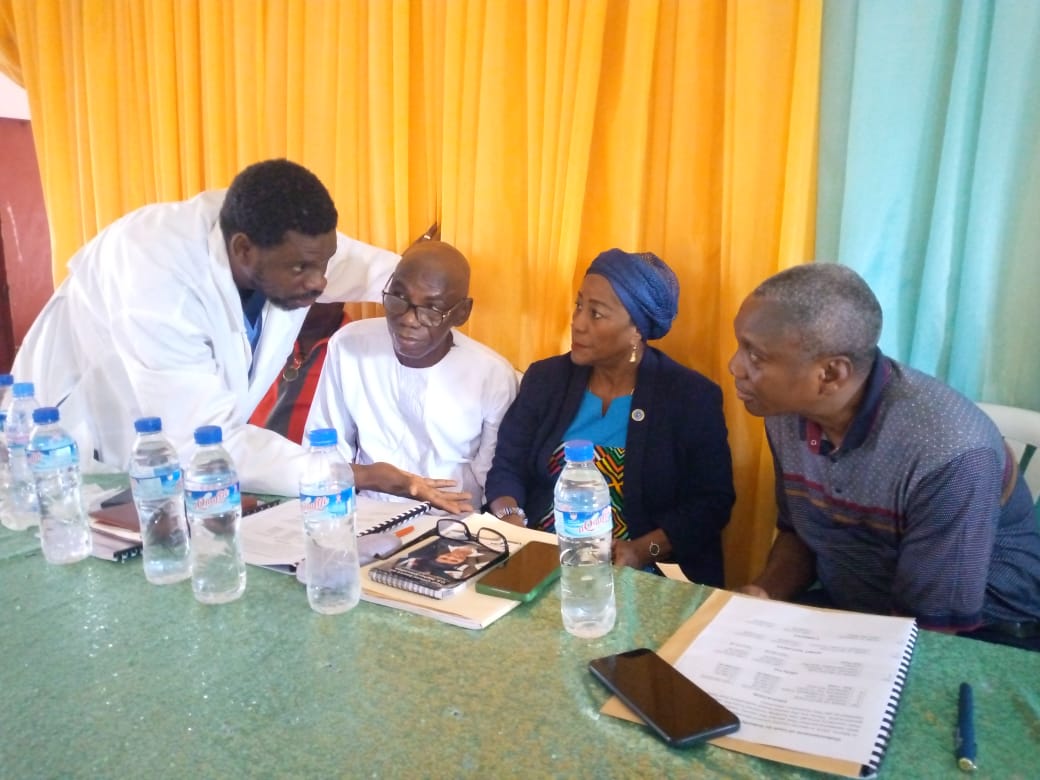
Education, health, and sports top the priority projects to be implemented with funding from the County Development Fund (CDF) for Rivercess County. In a resolution at the 2023 county sitting, about 18.4% of the fund was allotted to health, and 23.25% to education. This means 41.65% of US$ 200.000, the total amount disbursed to the County as County Development Fund (CDF) was allotted to education and health. Also, complying with the 2018 Local Government Act that promotes decentralization and the establishment of the County Council, nine persons were inducted into office as County Council members to provide supervision and oversight on funds allocated for county development. Those inducted into office included women, youth chiefs, elders, and persons living with a disability.
Citizen-driven projects have been a major concern for ordinary citizens in the county, including, the media, and local and national civil society organizations. During the 7th County Sitting in Rivercess County, US$141,000.00 was allotted to the reconstruction of Commissioners’ compounds. Also, earlier this year, the County Received US$636,385.08 or L$99,267,074.81 as County Social Development fund (CSDF) arrears. Of that amount, over 51% (i.e. $327,041.08 ) was allocated to building, renovating, and reconstructing commissioner’s offices, and superintendent residences, and purchasing motorbikes for county officials. Thankfully, the July 2023 allotment has prioritized citizens to a larger extent.
During the just-ended July 2023 Special County Development Council Sitting for the appropriation of US$ 200,000.00 received from the government as the 2023 County.
Development Fund(CDF), the county allocated US$ 31,500.00 to construct an Elementary and Junior High School in Samgbalor Administrative District, US$ 29,800.00 for the construction of an Operational Theater at the Boegeezay Health Center in Morweh Statutory District, and US$ 28,000.00 for the construction of players and referees dressing rooms and Bathrooms at Darsaw Town Sports Pitch. Also, US$ 4,500 was allocated for the completion of the Darsaw Town Elementary School Annex in Zarflahn Administrative District. Delegates also allocated US$ 21,500 to rehabilitate the 44-kilometer road from Yarpah Town to Garpu Town and US$ 7,000.00 was allotted for the Renovation of the Gblorseo Town Community Clinic in Nywoine Administrative District.
In Central River Cess Administrative District, the county allotted US$ 5,000.00 for the replacement of the entire roof of the Zammine Town Elementary School. In addition to education, delegates allotted US$ 3,000 to subsidize the River Cess University Student Union (RUSU) tuition and US$ 2,500 as a stipend for volunteer teachers at the Cestos High School. Basic infrastructure received US$ 134,400.00, constituting 67.2%, and subsidy provided to over seven institutions and local administration was allotted US$ 36,800 thus, constituting 18.4%. While US$ 180,000 was allocated for activities and projects, US$ 5,300 was for liability, and US$ 20,000 was for Administrative and Operational Costs. Also, in compliance with the Local Government Act 2018, a County Council sitting was held and nine persons were sworn into office to supervise and provide oversight on developments in the county.
As part of efforts to curb abuse and mismanagement of public resources, and ensure accountability and impact-driven citizens-led development in the county, members of the council were selected from diverse sectors in the county including, the youth, women, persons living with disability, women, chief and Elder.
As a leading civil society voice promoting transparency and accountability in Liberia, the Center for Transparency and Accountability in Liberia (CENTAL) was represented at the sitting in a bid to contribute to the promotion of transparency and the equal participation of citizens of diverse backgrounds. Through its Open Expenditure Initiative (OEI) activities, CENTAL has educated and trained county officials and ordinary citizens about development funds and encouraged them to ensure transparency, accountability, and citizens’ equal participation in all implementation.
Citizens Accuse Health Facility of Charging Higher Fees for Newborn Boys
Citizens Accuse Health Facility of Charging Higher Fees for Newborn Boys
By: Akiah P. Glay Dormoh
In Grand Bassa County, the Gorblee Health Center, a government hospital stands accused of charging fees according to the sex of a newborn child. It is well-known that resources allotted to hospitals are stretched thin. Nonetheless, the disparity in fee payment has considerably raised eyebrows.
In Gaye Peter Town, Compound #3, Grand Bassa County, citizens did not only accuse the facility of charging excessively when pregnant women go to the hospital to give birth, they also laid a charge that the amount the facility collects after the delivery of a boy differs from that which is charged for the delivery of a girl. Citizens have told CENTAL that Five Thousand Liberian Dollars (L$ 5,000) is charged as fees for a girl child born at the facility and Seven Thousand Liberian Dollars (L$7,000) is charged for a newborn boy. Speaking with CENTAL’s Open Expenditure Initiative team members, Madam Victoria (not her real name) who occupies a key position in the community alluded to the impact of the situation. “I have three children, two boys, and a girl. I was told to pay L$4,000 for my daughter and L$7,000 for my sons. I begged and paid 4,500 and 6,500 each. This has made me stop giving birth because I don’t have that kind of money to pay every time,” she said. Several other citizens confirmed the allegation, including prominent and eminent citizens in the community.
Meanwhile, Madam Lydia Kanneh, Officer-In-Charge (OIC) of the health center, denied the allegations. “The minimum amount charged at the hospital is 2,500 and this is cut across, whether male or female. Unless in extreme cases, then more than that will be required. Otherwise, the aforementioned amount is constant,” Madam Kanneh noted. According to her, the purpose of such a fee is to buy hospital materials and compensate midwives who serve as Community Health Providers. In 2016, the government and its partner launched a National Health Assistant Program that ensured traditional midwives were trained to serve and provide assistance to pregnant women living five kilometers or further from a health facility before referrer to a hospital. This remedy emerged due to the high maternal mortality rate observed in the country. The most alarming thing is that pregnant women are charged to access public health facilities that the National Health Policy deemed free.
The 2011-2021 National Health Policy plan[i] mandates free health services for pregnant women. According to the policy, even low fees could deter health-seeking behavior. Therefore, to encourage the uptake of priority services by all people, there should be no fee attached. Imagine if a pregnant woman comes to give birth and doesn’t have money, what will be the outcome? Even as Liberia encourages hospital deliveries to lower newborn maternal death rates, the policy has the opposite impact. Liberia has one of the highest rates of death for newborns in the world. According to UNICEF, 76 of 1,000 births. The maternal mortality rate from the 2019-2020 Country Health[ii] Survey indicates 93 deaths per 1,000 live births in the 5 years in Liberia preceding the survey, while child mortality was 33 deaths per 1,000 live births and infant mortality is 63 deaths per 1,000 live births. this situation cannot be unique to the Gorblee health center, but other centers in Liberia alike; For instance, FrontPage Africa Reported in 2020 that the acting administrator of Phebe[iii] Hospital warned that patients, who require surgery and emergency services would be made to pay for the cost of fuel. This, according to Rev. Victor Padmore, would help sustain the services at the hospital. Though the policy indicates free, but citizens have always either brought their own supplies or paid some fees. Viola Makor, a resident midwife at the Link Maternal Waiting Home and the reproductive health supervisor for Suakoko District in Bong County attested when she spoke with Yassah Levelah, the CEO of Comfort Closet that many[iv] women in the community shy away from hospitals because of the demand from the hospitals. For the policy to impact the general public, one of the primary concentrations of the government should be to prioritize health, including ensuring information about healthcare prices is clear and accessible to the public together with increasing healthcare workers’ salaries.
[i] http://moh.gov.lr/wp-content/uploads/National-Health-Policy-Plan-MOH-2011-2021.pdf
[ii] Libera Demographic and Health Survey 2019-20
[iii] https://frontpageafricaonline.com/health/liberia-stranded-phebe-hospital-charging-patients-for-fuel-fee-before-treatment/
[iv] https://www.npr.org/sections/goatsandsoda/2022/10/15/1126110420/giving-birth-in-liberia-you-might-need-to-bring-your-own-bleach-to-get-in-a-hosp
John Doe ‘Liberia Stranded Phebe Hospital’ (2022) Frontpage Africa < https://frontpageafricaonline.com/health/liberia-stranded-phebe-hospital-charging-patients-for-fuel-fee-before-treatmen t/> accessed 5 June 2023.
Commitments and Cautions: CENTAL Gathers Feedback from Citizens During Awareness Around New Corruption Reporting App in Liberia
Commitments and Cautions: CENTAL Gathers Feedback from Citizens During Awareness Around New Corruption Reporting App in Liberia
In the fight against corruption, all hands are needed on deck. And this is why, the Center for Transparency and Accountability in Liberia (CENTAL), through the Ant- Corruption Innovative Initiative, is harnessing the collective energy of ordinary citizens, who feel the most pinch of corruption to report anonymously any act of corruption. The initiative is being supported by the government and people of Sweden through the Swedish International Development Cooperation Agency (SIDA) via the United Nations Development Program (UNDP),
“We will do our best to use the app to report corruption when we see it. We will not close our mouths when we see corruption” said Eric Dunn, a resident of Wyne community, Harlandsville, Grand Bassa County, during an engagement meeting. Under the initiative, a mobile application called ‘TALKAY’ has been developed to provide citizens the platform to report corruption allegations anywhere in Liberia without disclosing their identities.
It is a red, white, and blue-colored mobile application that allows citizens to send reports of corruption to the Liberia Anti-Corruption Commission (LACC) in real-time. The LACC then investigates the report and takes appropriate action.
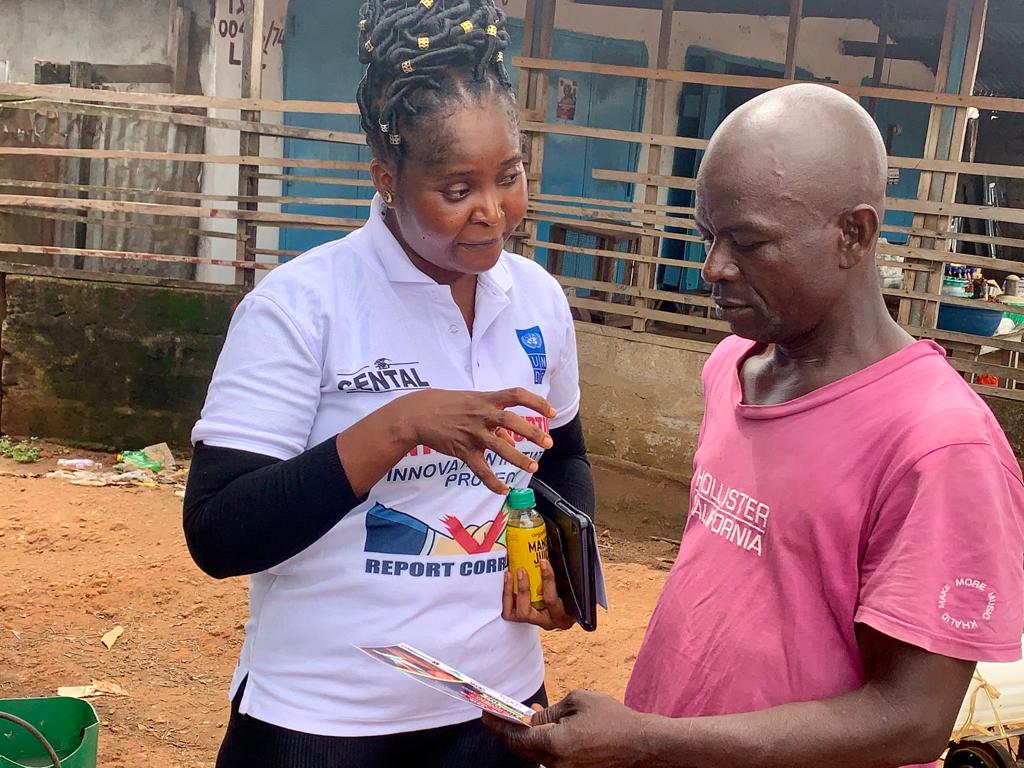
In Grand Bassa County, during an engagement with students at the Salvation Army Dorathy Knightley School, Atty. Bendu Kpoto, CENTAL’s Legal Officer explained that corruption comes in different shapes and forms including misuse of entrusted powers for personal gains. With a specific focus on the effects of corruption, Jerryline T. Wonde, CENTAL’s Youth Engagement Coordinator, lectured a cross-section of street vendors in the City of Buchannan on how corruption destroys the future of young people and denies them opportunities for growth. And Siafa S. Kamara, of the Advocacy and Legal Advice Center (ALAC), advised against soliciting bribes.
“One of the surest ways to succeed in the fight against corruption is to address the salary disparities in the civil service”, said Johnson William, head of the Police Detachment of Grand Bassa County at an engagement meeting held at his office. Also, Daniel Willie, Assistant Superintendent for Fiscal Affairs, applauded the initiative and expressed his commitment to help spread the word. He warned that despite the fact that the app is one of the best ways to reduce corruption, its success in the public sector will be reliant on political will and commitments from higher-ups in government.
For his part, Jerry E. Brooks, Mayor of St. John City blamed the pervasiveness of corruption on inadequate budgetary support to critical organs of the government including the City of St. John. He admonished CENTAL to include Advocacy for increased support to key government agencies in future programs. “When incentives are given, corruption will be minimized”, he stated.
If the views espoused by stakeholders including Mayor Brooks, Police Commander Williams, and Assistant Superintendent Willie are anything to go by, the war against corruption will be won when public service is adequately incentivized. And that the national budget working for few members of the legislature, as contained in CENTAL’s budget paper, and leaving the vast majority of the citizenry to stay in poverty and neglect must be a thing of the past.
LOCATION
22nd Street, Sinkor
Tubman Boulevard
Monrovia, Liberia
Phone: +231 88 681 8855
Email: info@cental.org.lr
Website: www.cental.org.lr
SUBSCRIBE
Get updates and important events straight to your inbox. We don't spam

